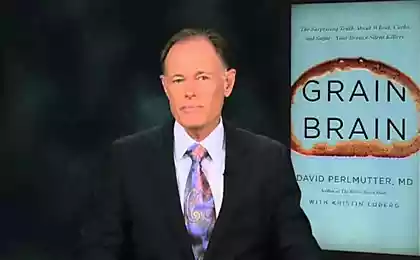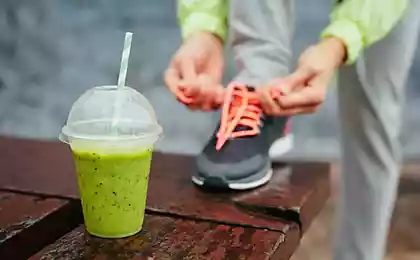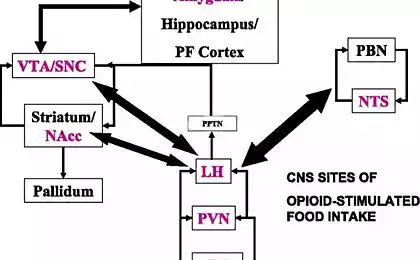613
The conflict of instincts: self-Preservation vs the Mind
The principle of the tail of the lizard and the health ofMany people when talking about health you start to regret saying that, lots of things need to abandon or significantly limit, and they have them so used. Of course, it is nice to feel sorry for yourself, but the truth is that to sit on two chairs is impossible.
In difficult situations, the choice is almost never pleasant, safe and profitable. So today I want to talk about the principle of the tail of a lizard about the inevitability of painful losses for the preservation of key resources in terms of danger, stress and forced circumstances. The survival instinct makes us avoid risk and survival instincts helps to take risks. How to find a balance?
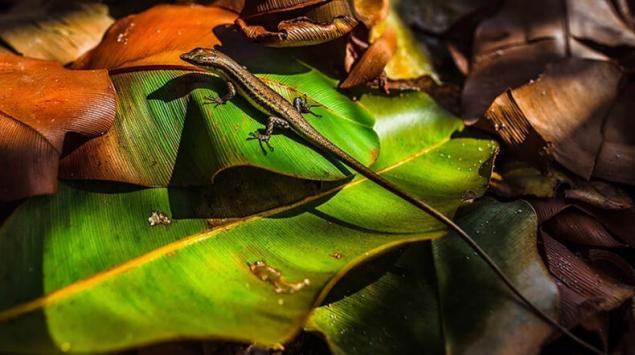
In ambiguous stressful situation often arises a conflict between two basic instincts: survival and self-preservation.
The instinct of self-preservation is a special form of behavior aimed at protecting their lives and health.
The survival instinct is an innate form of behavior of living beings in case of danger, to save himself from this danger. The implementation of this instinct are such feelings as pain and fear. The pain is felt usually as an abnormal condition of an organism which must somehow be eliminated. Fear causes a living creature to seek refuge. Animals are hiding and run away, but the man is trying to protect from the source of stress.
But what if it cannot be done? It is impossible to run and hide from the stressors that continue to cause damage? Many people resort to different mechanisms of mental defenses, trying to come to terms with the current position. They justify this by saying that "better a bad peace than a good war", trying to preserve what they have at any price. But the unpleasant truth is that this strategy won't work in a really serious situation. The survival instinct makes us avoid risks.
Instinct causes us to press and not to let go of what we have under any pretext. This is the body that blocks fat loss under stress. Looks reasonable, but actually we are like monkeys, fell for the banana in such a situation. That's the way in India and South Africa to catch monkeys. To the tree, tie a jar with a narrow neck. In a jar put a banana. Passing by the monkey sees the banana and thrust his paw into the jar, grabs him in a wide area banks.
Now the monkey tries to pull the banana out of the jar, but it fails because the narrow throat produces a paw clutching a banana. Monkey see, as it approaches the catcher, tries to escape, but cannot because she did not pull his paw from the jar that is tied to a tree.
Although the acquaintance with the trappers she obviously does not deliver pleasure, and the causes of its troubles are definitely the banana and the Bank, she never wants to part with the banana that would allow her to remove his paw from the jar. She is literally attached to the banana, which of the potential source of pleasure has become a source of suffering. We are like that monkey.
In our lives lots of "bananas", to which we are accustomed or aspire, and though they bring us suffering, we can't seem to part with them. Some of them — all kinds of habits, such as cigarettes, coffee, tranquilizers, alcohol, genetically modified food, money or other material values. By themselves, these things are not bad, but in some cases they can harm our health or happiness. And we, knowing this, nevertheless, you can't get rid of them, because I'm used to it and consider it "part of yourself".
The instinct of survival and the risk
Survival instinct is a life impulse, which is directly linked to the fear of death. Death in this case means anything that represents a danger that makes us to feel its weakness, the sensation that provokes the crisis to which we respond that momentum libido, what evolutionists would call a sense of survival.
The instinct of survival overcomes the instinct of self-preservation in those cases, when to hide or avoid the stressor becomes unprofitable. From the point of view of survival, it is better to take the risk.
Feature of instinct, risk-taking behaviors is the fact that it manifested decreased self-preservation instinct, because it pushes the individual to the dangerous behavior that can lead to injury or even death.
At risk behavior is also influenced by culture and social conditions. Man has always existed in a situation of necessity to show risky behaviour, i.e. decision-making, the consequences of which are uncertain and often negative or even deadly. The threat of predators, natural phenomena, wars created almost permanent situation of risk. Risk appetite is a fairly stable characteristic of the individual and is associated with such personality traits as impulsivity, independence, the desire to succeed, tendency to dominate.
Discarding the need for survival
The classic biological example is the mechanism of action of leptin. This hormone regulates metabolism and helped our ancestors to survive in harsh conditions lack of calories. Unfortunately, the modern theory of counting calories does not take into account this mechanism. How did they survive prisoners in concentration camps who received 700 to 800 calories a day? If the theory of calorie counting is correct, then, according to her, they would have to die, used all their reserves deferred fat that is a few months later.
For example, when the daily needs of 2500 calories people for long time, consume that number of calories. If suddenly this number of calories is reduced to 2,000, the body begins to compensate for the missing quantity at the expense of reserve fat, and, accordingly, is weight loss.
On the other hand, if the intake of calories established at the level of 2000 after the previously received 2500, the body under the action of the instinct of survival will quickly adapt to this level of calories. And then the weight loss will stop.
But the body is very smart. The survival instinct encourages him to greater caution, and this caution will be aimed at creating reserves. If he continues to give only 2000 calories — well, well! It will reduce your energy needs by up to 1700 calories, for example, a difference of 300 calories lay in reserve in the form of visceral fat.
And here comes a paradoxical thing: although people are eating less (and its body, accordingly, receives fewer calories), it starts slowly to recover, postponing the fat in the liver and in the mesentery.
In these cases, the body goes into deficit in order to slow down energy expenditure and through difficult times. It is known that many animals can and do hibernate. The mode of deficit — an adaptation to the starving time.
The body in the deficit regime tries by all means to slow down the calorie expenditure. This termination of siasimuna, slowing of physical activity, decreased motivation and efficiency, suppression of sexual and reproductive function. It's off the thyroid and ovaries.
The deficit regime is to activate eating behavior on the search for high-calorie foods, disabling saturation and maximum fat gain. Under stress, leptin helps us to survive, cutting off that which is unnecessary: the immune system, reproductive system, skeletal system, turning the body in the mode of scarcity. But on the cardiovascular system leptin not save and it is clear: the cessation of its energy supply will lead to death.
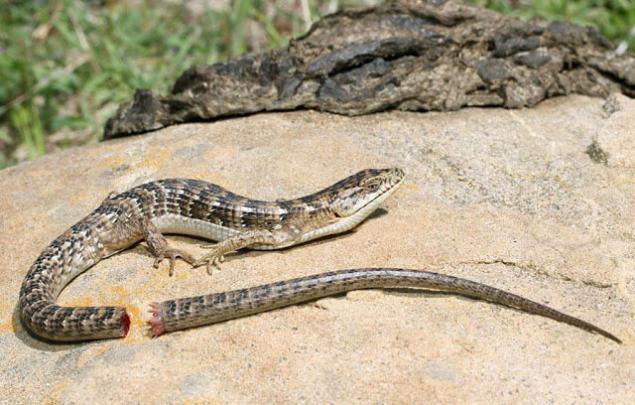
Leptin and the principle of lizards
The leptin hormone is teaching us this simple wisdom: you need to be able to sacrifice in order to survive. The unwillingness to sacrifice important will not give you the ability to win in difficult situations. We must be ready to sacrifice their perfectionism (all or nothing) for their own salvation. Let's take the example of a lizard. Without hesitation she leaves his tail in the predator's teeth or in our hands, but she escapes. Critically important to learn to make choices.
Any stressful situation involves at least two outputs: the worst is to leave everything as is and wait for the worst, the best, sacrificing a relatively small, to save himself, his health and win. \In case of inadequate personal boundaries to apply the principle of the tail of lizards is problematic. Why? If you think that something is an integral part of your personality, you will not be able to donate it. And many people have a hugely inflated personal boundaries, which make them very unwieldy.
This is the principle of lizards: to give an important to keep the main thing. The principle of lizards is the tail (body part) in exchange for life. To maintain a vital, essential from the nonessential, not needed for survival. For a proper understanding of the metaphor, let me remind you that to lose the tail for a lizard is not so easy. Therefore, prior to this, she assesses how big a threat to her life. The process of dropping the tail is completely regulated by the brain, and is not a reflex.
How does it happen?
The tail of lizards is a spine from multiple zones, connected by cartilage, ligaments and muscles. Each zone may rupture. When threatened, the muscles and ligaments in the immediate area are reduced, torn apart, and the tail is separated. The severed tail continues to shrink and move, thus distracting attention. And its former owner this time escapes from danger.
When a lizard grows a new tail, the vertebrae in the place of isolation is not restored in their place by cartilage. So each time a separation occurs. Tail of small lizard-grows in about a month. At larger, this process requires up to one year.
Lizard without a tail is not as nimble and quick, she may lose the ability to reproduce, and runs poorly on climbs due to the lack of "steering". Water lizards can't swim and are forced to change their way of life.But most importantly — many of the lizards tail is used for the accumulation of fat and nutrients, and therefore all the energy they have is concentrated in the tail. Therefore, after its detachment, the animal may die of exhaustion. So often rescued the lizard tries finds his tail and eat it to restore lost power.
How to stay young: 3 simple exercises against illness of old age,Visceral fat: a source of problems in men
Conclusion
Ask yourself how you want to live? Remember the freedom-loving predators that chew through my own leg caught in a trap. I remember an episode from a movie where the guilty mafia leader offers: teeth to bite off your own finger or get shot. The guilty could not and was killed.Would you be able?published
Author: Andrey Blueskin
P. S. And remember, only by changing their consumption — together we change the world! ©
Source: www.beloveshkin.com/2017/01/princip-khvosta-yashhericy-i-zdorove.html
In difficult situations, the choice is almost never pleasant, safe and profitable. So today I want to talk about the principle of the tail of a lizard about the inevitability of painful losses for the preservation of key resources in terms of danger, stress and forced circumstances. The survival instinct makes us avoid risk and survival instincts helps to take risks. How to find a balance?

In ambiguous stressful situation often arises a conflict between two basic instincts: survival and self-preservation.
The instinct of self-preservation is a special form of behavior aimed at protecting their lives and health.
The survival instinct is an innate form of behavior of living beings in case of danger, to save himself from this danger. The implementation of this instinct are such feelings as pain and fear. The pain is felt usually as an abnormal condition of an organism which must somehow be eliminated. Fear causes a living creature to seek refuge. Animals are hiding and run away, but the man is trying to protect from the source of stress.
But what if it cannot be done? It is impossible to run and hide from the stressors that continue to cause damage? Many people resort to different mechanisms of mental defenses, trying to come to terms with the current position. They justify this by saying that "better a bad peace than a good war", trying to preserve what they have at any price. But the unpleasant truth is that this strategy won't work in a really serious situation. The survival instinct makes us avoid risks.
Instinct causes us to press and not to let go of what we have under any pretext. This is the body that blocks fat loss under stress. Looks reasonable, but actually we are like monkeys, fell for the banana in such a situation. That's the way in India and South Africa to catch monkeys. To the tree, tie a jar with a narrow neck. In a jar put a banana. Passing by the monkey sees the banana and thrust his paw into the jar, grabs him in a wide area banks.
Now the monkey tries to pull the banana out of the jar, but it fails because the narrow throat produces a paw clutching a banana. Monkey see, as it approaches the catcher, tries to escape, but cannot because she did not pull his paw from the jar that is tied to a tree.
Although the acquaintance with the trappers she obviously does not deliver pleasure, and the causes of its troubles are definitely the banana and the Bank, she never wants to part with the banana that would allow her to remove his paw from the jar. She is literally attached to the banana, which of the potential source of pleasure has become a source of suffering. We are like that monkey.
In our lives lots of "bananas", to which we are accustomed or aspire, and though they bring us suffering, we can't seem to part with them. Some of them — all kinds of habits, such as cigarettes, coffee, tranquilizers, alcohol, genetically modified food, money or other material values. By themselves, these things are not bad, but in some cases they can harm our health or happiness. And we, knowing this, nevertheless, you can't get rid of them, because I'm used to it and consider it "part of yourself".
The instinct of survival and the risk
Survival instinct is a life impulse, which is directly linked to the fear of death. Death in this case means anything that represents a danger that makes us to feel its weakness, the sensation that provokes the crisis to which we respond that momentum libido, what evolutionists would call a sense of survival.
The instinct of survival overcomes the instinct of self-preservation in those cases, when to hide or avoid the stressor becomes unprofitable. From the point of view of survival, it is better to take the risk.
Feature of instinct, risk-taking behaviors is the fact that it manifested decreased self-preservation instinct, because it pushes the individual to the dangerous behavior that can lead to injury or even death.
At risk behavior is also influenced by culture and social conditions. Man has always existed in a situation of necessity to show risky behaviour, i.e. decision-making, the consequences of which are uncertain and often negative or even deadly. The threat of predators, natural phenomena, wars created almost permanent situation of risk. Risk appetite is a fairly stable characteristic of the individual and is associated with such personality traits as impulsivity, independence, the desire to succeed, tendency to dominate.
Discarding the need for survival
The classic biological example is the mechanism of action of leptin. This hormone regulates metabolism and helped our ancestors to survive in harsh conditions lack of calories. Unfortunately, the modern theory of counting calories does not take into account this mechanism. How did they survive prisoners in concentration camps who received 700 to 800 calories a day? If the theory of calorie counting is correct, then, according to her, they would have to die, used all their reserves deferred fat that is a few months later.
For example, when the daily needs of 2500 calories people for long time, consume that number of calories. If suddenly this number of calories is reduced to 2,000, the body begins to compensate for the missing quantity at the expense of reserve fat, and, accordingly, is weight loss.
On the other hand, if the intake of calories established at the level of 2000 after the previously received 2500, the body under the action of the instinct of survival will quickly adapt to this level of calories. And then the weight loss will stop.
But the body is very smart. The survival instinct encourages him to greater caution, and this caution will be aimed at creating reserves. If he continues to give only 2000 calories — well, well! It will reduce your energy needs by up to 1700 calories, for example, a difference of 300 calories lay in reserve in the form of visceral fat.
And here comes a paradoxical thing: although people are eating less (and its body, accordingly, receives fewer calories), it starts slowly to recover, postponing the fat in the liver and in the mesentery.
In these cases, the body goes into deficit in order to slow down energy expenditure and through difficult times. It is known that many animals can and do hibernate. The mode of deficit — an adaptation to the starving time.
The body in the deficit regime tries by all means to slow down the calorie expenditure. This termination of siasimuna, slowing of physical activity, decreased motivation and efficiency, suppression of sexual and reproductive function. It's off the thyroid and ovaries.
The deficit regime is to activate eating behavior on the search for high-calorie foods, disabling saturation and maximum fat gain. Under stress, leptin helps us to survive, cutting off that which is unnecessary: the immune system, reproductive system, skeletal system, turning the body in the mode of scarcity. But on the cardiovascular system leptin not save and it is clear: the cessation of its energy supply will lead to death.

Leptin and the principle of lizards
The leptin hormone is teaching us this simple wisdom: you need to be able to sacrifice in order to survive. The unwillingness to sacrifice important will not give you the ability to win in difficult situations. We must be ready to sacrifice their perfectionism (all or nothing) for their own salvation. Let's take the example of a lizard. Without hesitation she leaves his tail in the predator's teeth or in our hands, but she escapes. Critically important to learn to make choices.
Any stressful situation involves at least two outputs: the worst is to leave everything as is and wait for the worst, the best, sacrificing a relatively small, to save himself, his health and win. \In case of inadequate personal boundaries to apply the principle of the tail of lizards is problematic. Why? If you think that something is an integral part of your personality, you will not be able to donate it. And many people have a hugely inflated personal boundaries, which make them very unwieldy.
This is the principle of lizards: to give an important to keep the main thing. The principle of lizards is the tail (body part) in exchange for life. To maintain a vital, essential from the nonessential, not needed for survival. For a proper understanding of the metaphor, let me remind you that to lose the tail for a lizard is not so easy. Therefore, prior to this, she assesses how big a threat to her life. The process of dropping the tail is completely regulated by the brain, and is not a reflex.
How does it happen?
The tail of lizards is a spine from multiple zones, connected by cartilage, ligaments and muscles. Each zone may rupture. When threatened, the muscles and ligaments in the immediate area are reduced, torn apart, and the tail is separated. The severed tail continues to shrink and move, thus distracting attention. And its former owner this time escapes from danger.
When a lizard grows a new tail, the vertebrae in the place of isolation is not restored in their place by cartilage. So each time a separation occurs. Tail of small lizard-grows in about a month. At larger, this process requires up to one year.
Lizard without a tail is not as nimble and quick, she may lose the ability to reproduce, and runs poorly on climbs due to the lack of "steering". Water lizards can't swim and are forced to change their way of life.But most importantly — many of the lizards tail is used for the accumulation of fat and nutrients, and therefore all the energy they have is concentrated in the tail. Therefore, after its detachment, the animal may die of exhaustion. So often rescued the lizard tries finds his tail and eat it to restore lost power.
How to stay young: 3 simple exercises against illness of old age,Visceral fat: a source of problems in men
Conclusion
Ask yourself how you want to live? Remember the freedom-loving predators that chew through my own leg caught in a trap. I remember an episode from a movie where the guilty mafia leader offers: teeth to bite off your own finger or get shot. The guilty could not and was killed.Would you be able?published
Author: Andrey Blueskin
P. S. And remember, only by changing their consumption — together we change the world! ©
Source: www.beloveshkin.com/2017/01/princip-khvosta-yashhericy-i-zdorove.html
Stretching all areas: how to improve posture and body line
Chemistry of feelings: how emotions affect our health









